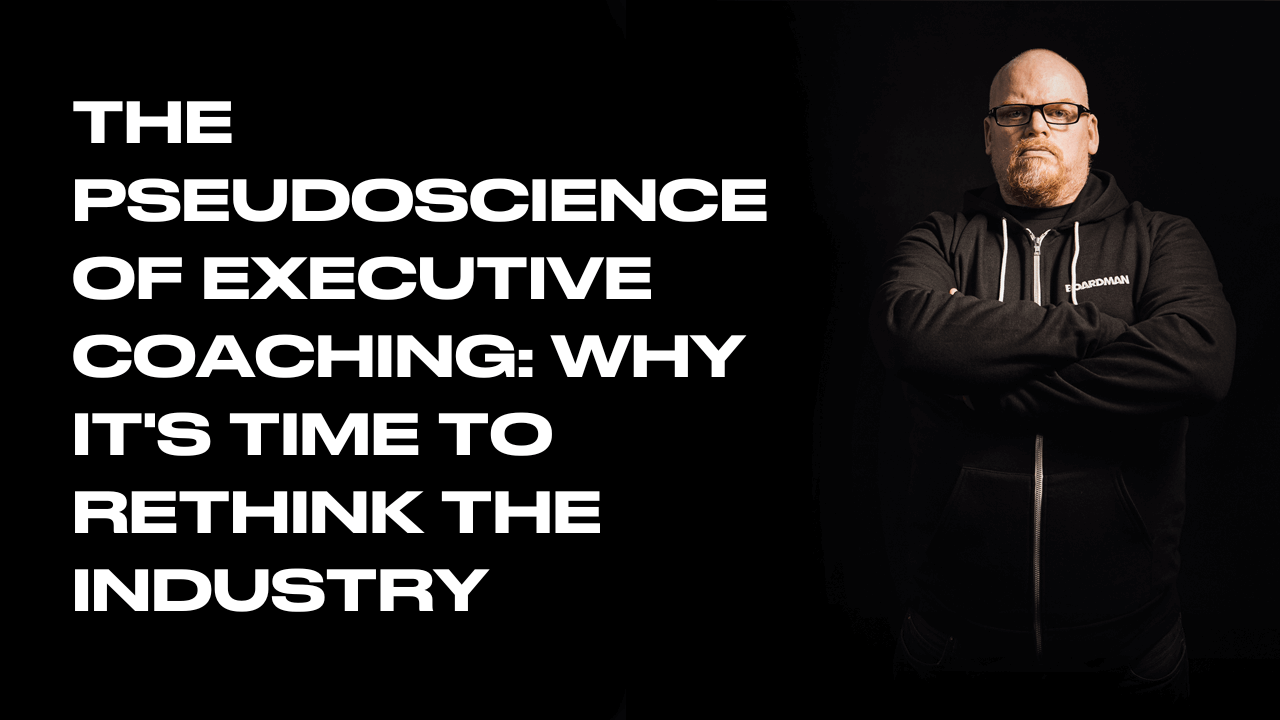
The Pseudoscience Of Executive Coaching: Why It's Time To Rethink The Industry
In an era where corporate performance is a non-negotiable and leadership competencies have never been more important, executive coaching has become the holy grail of organizational development.
According to a 2019 study conducted by Stanford University, nearly two-thirds of CEOs do not receive outside leadership advice, yet they all want it ("lonely at the top" resonates for a reason)
Today's organizational leaders are seeking executive coaches at an unprecedented rate, with the global executive coaching market expected to reach $1.34 billion by 2022.
However, with its burgeoning popularity and profitability, executive coaching has morphed into a wild west of methodologies and practices, some of which are grounded more in pseudoscience than real, actionable insights.
Therein lies a paradox: a tool designed to optimize leadership efficacy and, by extension, company performance, seems to be lacking the rigorous underpinnings necessary to consistently deliver on this promise.
Navigating Through the Pseudoscience
Pseudoscience, at its core, is a collection of beliefs or practices mistakenly regarded as being based on the scientific method.
A common occurrence in the executive coaching industry is the unchecked prevalence of proprietary models and techniques that lack empirical validation. Though these models might be built with the best of intentions, their effectiveness remains anecdotal, at best.
Many coaching models are based on general observations and individual experience, not systematic research.
Take, for example, the "GROW" model (Goals, Reality, Options, Will). It’s widely used but lacks rigorous scientific backing.
While such models may prove beneficial for some, they lack the predictability and reliability needed in a business context.
The Dangers of Misinformation
When pseudoscientific methodologies become the standard in executive coaching, misinformation spreads, leading to suboptimal outcomes and a degradation of trust in the coaching industry.
A 2016 study in the International Journal of Evidence Based Coaching and Mentoring found that only 28% of coaching practitioners used evidence-based approaches.
This indicates a troubling gap between research and practice.
The Case for Evidence-Based Coaching
Evidence-based coaching (EBC) borrows principles from the medical field's evidence-based practice, incorporating the best available research evidence, professional expertise, and the client's values and expectations.
This approach helps ensure that coaches aren't just well-intentioned but also effective.
By delivering proven strategies, EBC provides a pathway to measurable, impactful results5.
A meta-analysis of 17 studies published in the Journal of Positive Psychology found that EBC interventions had a medium to large positive effect on outcomes.
This result reinforces the notion that grounding executive coaching in science is not just feasible but also desirable.
Rethinking the Industry: The Path Forward
As leaders in mid-stage scaling or fast-growing companies, it's time to recalibrate our expectations and our approach to executive coaching. To transform the industry, we need to pivot from pseudoscience to evidence-based practices.
Demand Empirical Validity
Organizations should demand coaches use methods grounded in empirical research. Making decisions based on proven approaches reduces the risk and increases the likelihood of successful outcomes.
Promote Transparency
Coaches should be transparent about their methods. This includes revealing the scientific (or non-scientific) basis for their approaches and being honest about the likely outcomes.
Incorporate Evidence-Based Practices
Companies need to promote the use of EBC and consider it as a key criterion when selecting executive coaches.
Bridge the Gap Between Research and Practice
More concerted efforts should be made to integrate academic research with real-world coaching practices. This may require partnerships between academia and the coaching industry.
As we navigate the future of executive coaching, it's crucial to ground ourselves in scientific rigor and evidence-based practices. By doing so, we can maximize the potential of executive coaching, creating a robust tool that reliably nurtures effective leaders and propels organizational growth.
If you are an ambitious professional looking to achieve your business goals and take your business to the next level, click here if you'd like to Book a 30-Minute Coaching Session with Ross.

